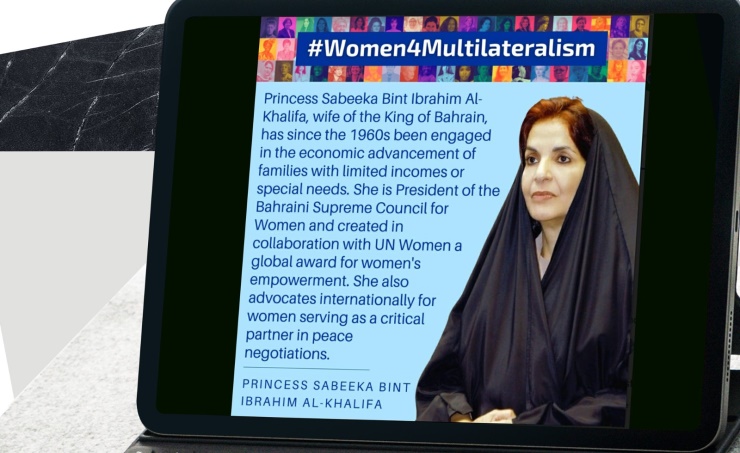Bahrain : Her Royal Highness Princess Sabeeka bint Ibrahim Al Khalifa, Wife of His Majesty the King and President of the Supreme Council for Women, is at the forefront of the list published by the Contemporary and Historical Women Leadership Initiative that was announced by the delegation of the European Union to the United Nations and the Permanent Mission of Gabon, on the occasion of UNESCO’s launch of the International Day of Women in Multilateralism.
Her Royal Highness Princess Sabeeka Bint Ibrahim Al Khalifa was selected from among a number of world leaders in multilateral work in view of the leadership roles played by Her Royal Highness in various developmental fields, her remarkable efforts and contributions in favor of the advancement of women nationally, and by working to create an encouraging and supportive ground for competencies, building quality experiences, and highlighting them on regional and international platforms.
The initiative celebrates the significant impact of Her Royal Highness’ efforts through her presidency of the Supreme Council for Women, represented in monitoring the progress of Bahraini women, supporting their participation in public life through political action and decision-making, enhancing their contributions to the national economy, and providing the foundations of their family stability and social security.
In addition to Her Royal Highness Princess Sabeeka bint Ibrahim Al Khalifa, the initiative listed a group of influential women leaders, such as Queen Marie Alexander (Wife of the King of Romania), Mrs. Zuzana Caputovà (first female President of Slovakia), Ms. Roza Otunbayeva (former President of the Kyrgyz Republic), Mrs. Kersti Kaljulaid (former President of Estonia), Ms. Marie Robinson (first female President of Ireland), Dr. Vaira Vike-Freiberga (first elected female President of Latvia), Ms. Maria Lourdes Pintasilgo (first female Prime Minister of Portugal), Mrs. Simone Veil (first female elected as President of the European Parliament), Mrs. Roberta Metsola (current President of the European Parliament from Malta), and Mrs. Ursula Von Der Leyen (President of the European Commission from Germany).
Last January, UNESCO inaugurated the International Day of Women in Multilateralism, based on a resolution spearheaded by Gabon, and adopted in November 2021 at UNESCO’s General Conference; in support and appreciation of the important and influential role of women in multilateralism to advance peace, security, human rights, and development.
During an exhibition held yesterday in Geneva, Switzerland, which will continue until March 10th 2022, the initiative was launched to highlight the role of contemporary and historical women leaders who contributed to the advancement of multilateralism, human rights (including women’s rights), development, and peace and security – in general or implicitly – through their work of leading and managing programs and initiatives that have made an impact at the local, regional, and global levels. In addition, the exhibition features the contributions of young women activists who pursue these ideals in their own countries, as well as women who are leading the multilateral process through senior positions in the United Nations or other international organizations.


